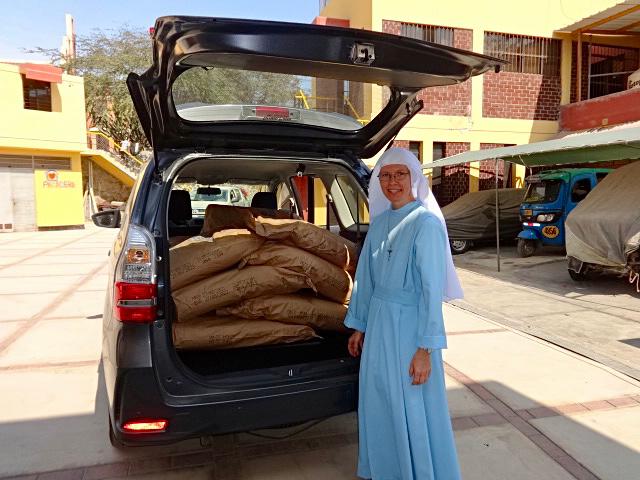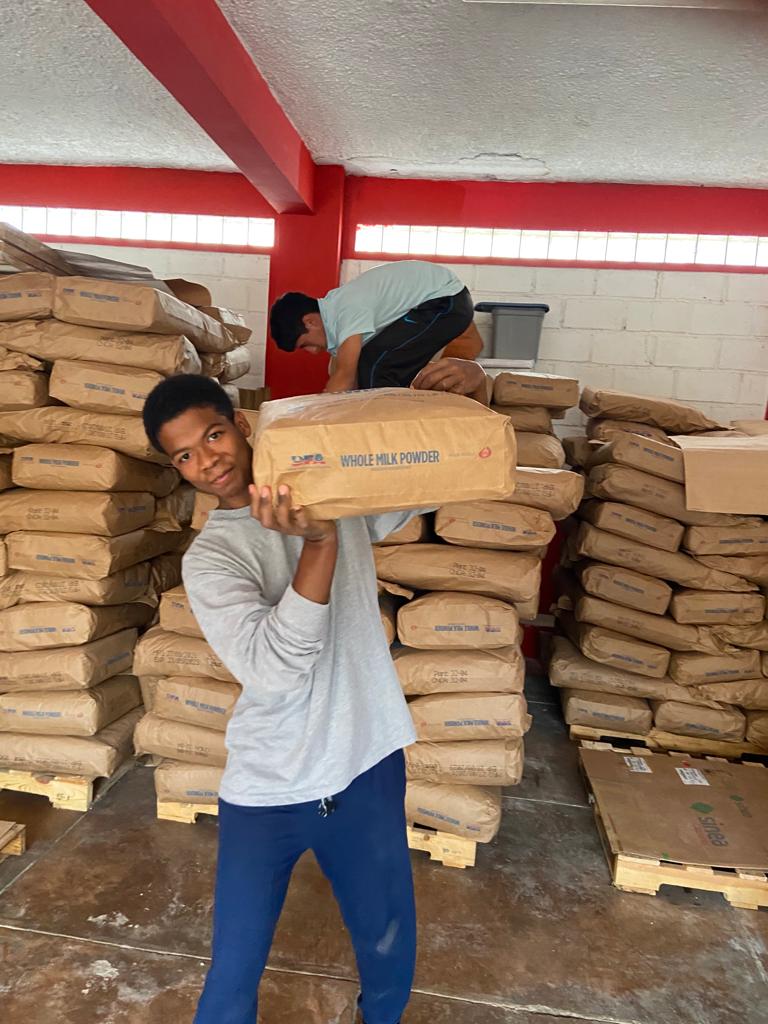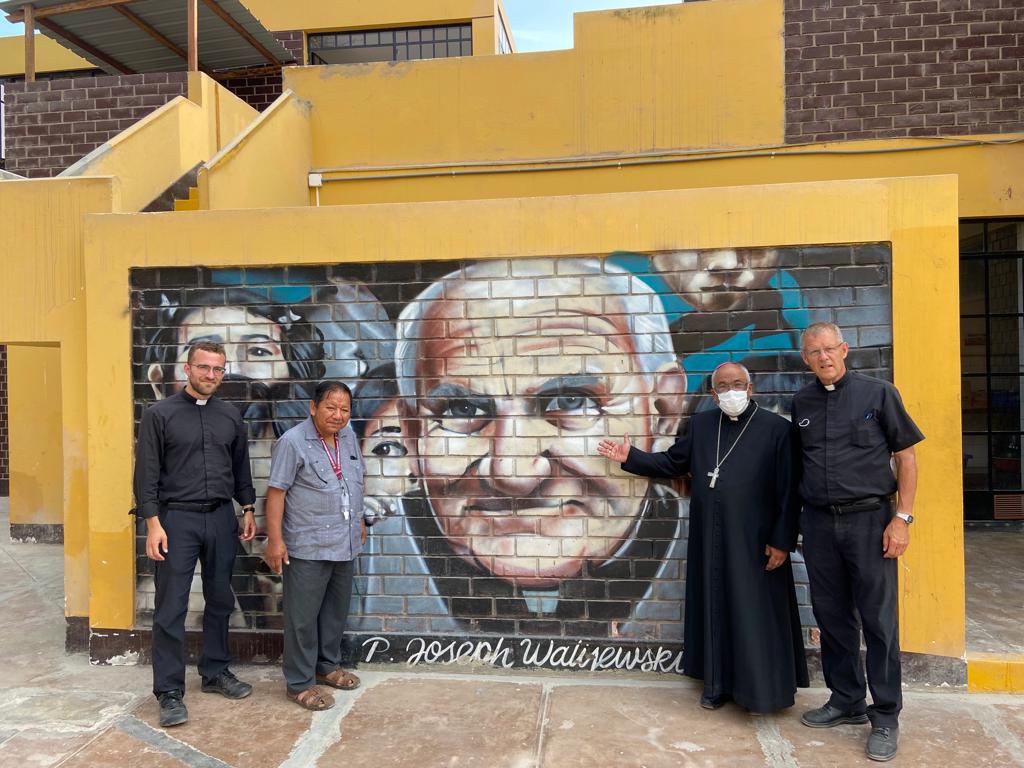Project Milk Celebrating 40 Years of Service
From Humble Beginnings
Like the mustard seed in Jesus’ famous parable, sometimes big things arise from small beginnings. That’s what happened in the 1980s when Father Joe Walijewski made his pitch for Project Milk to the Most Reverend Bishop William Freking. Father Walijewski had been in Peru since 1971, and he had seen, firsthand, the poverty and desperation of the people of Lima. He told stories of children living in the streets and of a boy who wouldn’t accept a sandwich from him because it “wasn’t his day to eat.” Bishop Freking, moved by compassion, provided the first $10 donation. By 1984 the first shipment of dried milk was on its way to Peru and Project Milk was born.
Today, 40 years later, the Diocese of La Crosse, through the Rural Life Committee and Project Milk, provides 40,000 pounds of dried milk to the people of Peru approximately once every year. This amounts to a shipment of 800 50-pound sacks. The cost to purchase and ship a single sack is about $100, so Project Milk needs to raise about $80,000 each year. The rural Midwest, which teems with dairy farms, is an ideal source of this milk. Father Walijewski’s dream of leveraging the bounty of Midwest dairy farmers to serve the desperately poor in Peru has grown from a tiny seed into a charity that affects every corner of the Diocese of Lurin.
Milk as a Currency of Compassion
At the same time Project Milk began, Father Walijewski also founded an orphanage called Casa Hogar Juan Pablo II. In another very effective pitch (likely made in Polish), Father Walijewski convinced Pope St. John Paul himself to donate $50,000 to help fund his orphanage. Today, Casa Hogar houses 64 orphaned or endangered children and more than 20 “Family Teachers,” who act as parents to the children under their care. In 1986, when construction was completed, Father Joe took on a new role as director of Casa Hogar. He continued to work on new missionary projects until his death on Palm Sunday, 2006. A cause has since been opened for his canonization.
Recently, Monsignor Joseph Hirsch, the director of Casa Hogar in Lurin, Peru, shared details during a Zoom call about the room where he stores the milk. He explained that the next shipment, expected to arrive in September, will completely fill a small classroom from floor to ceiling. Monsignor Hirsch always keeps a few dozen sacks of milk on hand to offer to visitors who frequently come to the door. He gives them milk in a plastic bag, hoping they will return for another visit. This is one of the ways he stays connected with the local community.
The future of Project Milk was uncertain as it approached its 40th anniversary. Due to its value, the milk requires constant attention to prevent theft, and transportation from the port is costly. Unfortunately, the port authorities often proved uncooperative by issuing fines for trivial or unexplained reasons. The expenses associated with the smaller milk shipments made it difficult to justify the costs as simply the “cost of doing business.” After much discussion, Monsignor Hirsch and others decided to wait until they had enough milk for a single shipment of 40,000 pounds. This milk would then be shared with missions across the Diocese of Lurin. Since then, the support and generosity from Project Milk donors have only continued to grow.

The initial shipments consisted of dried skim milk, but Project Milk has recently started providing whole milk, which is more popular and better tasting. Monsignor Hirsch stated that this kind of milk is not available to anyone else in Peru. As a result, Casa Hogar uses the milk to barter for necessary services, such as counseling for children dealing with emotional trauma. These children often come from broken families and require these services, which cost is approximately $400 per month. By providing milk to the treatment centers, Casa Hogar is able to obtain counseling services for the children at a fraction of the cost.
At Casa Hogar, they serve the children a healthy and nutritious breakfast by adding steel-cut oats to the milk. On movie nights, Monsignor Hirsch prepares a popular concoction for the kids that he calls avena gourmet, or “gourmet oatmeal.” This popular dish is made with eggs, the donated powdered milk, seven-grain cereal, chocolate, and peanut butter. “It’s the most popular food I serve on movie night,” he says with a smile. He prepares two large pots, and any leftovers are eagerly taken home by the children to enjoy for breakfast the next day.
To Casa Hogar and Beyond
The Project Milk deliveries are first sent to Casa Hogar, where the milk is stored and used by the residents. However, its impact extends far beyond, benefiting the surrounding communities. After fulfilling the needs at Casa Hogar, the remaining milk is distributed to various organizations aiding those in need. Catholic Charities, which operates shelters and soup kitchens in the Diocese of Lurin, received 200 sacks, and 150 sacks were sent to Sagrada Familia, a refuge for children from Peru’s poorest regions. Additionally, 50 sacks were given to flood refugees, and another 100 were shared with two orphanages and a local parish. Families in need also received smaller portions, distributed in four- or five-pound sacks, ensuring that no one is left without support.
Noel Furger, director of development for The Father Joseph Walijewski Legacy Guild and Casa Hogar, described some other interesting ways a portion of the Project Milk shipments have been put to good use. In 2022, as part of a solar clean-water project, Brother Miguel of Sagrada Familia took some of the milk deep into the jungle. He journeyed by plane and a 16-hour boat ride to a remote community without access to electricity. The families he served had never had access to milk before.

In March 2023, Cyclone Yaku swept across Peru and Ecuador. Due to Lima’s typically arid climate, the relentless downpour resulted in widespread flooding and mudslides. Project Milk offered 50 bags of milk to assist those who were displaced by the flooding. Additionally, aid was delivered to mission parishes like Manchay and Santa Rosa, which serve huge areas affected by desperate poverty.
Sister Carla Harrison, originally from Wisconsin Rapids, and other Daughters of Our Lady of the Pieta distribute milk to the poorest of the poor who arrive at their doorstep. The sisters and visiting seminarians also bring along milk when visiting shut-ins. According to Monsignor Hirsch, the milk is part of their evangelization. “You come in, you speak to a family and you give them a gift. It’s a nice gift, and you know that they appreciate it.”
A Wonderful Work of Charity
The Diocese of La Crosse, through the Rural Life Committee and Project Milk, has helped Casa Hogar’s mission bloom and become a powerful example of charity in the Diocese of Lurin. Bishop Carlos Garcia Camader publicly thanked Casa Hogar and Project Milk at a recent meeting of presbyters for their contributions to the Diocese of Lurin. The Rural Life Committee and Project Milk are tremendously grateful to their donors, who make this wonderful work of charity possible. May this seed of Christ’s love continue to grow for the next 40 years and beyond.
Story by Dan Rislove
Published in the November/December 2024 issue of Catholic Life Magazine

